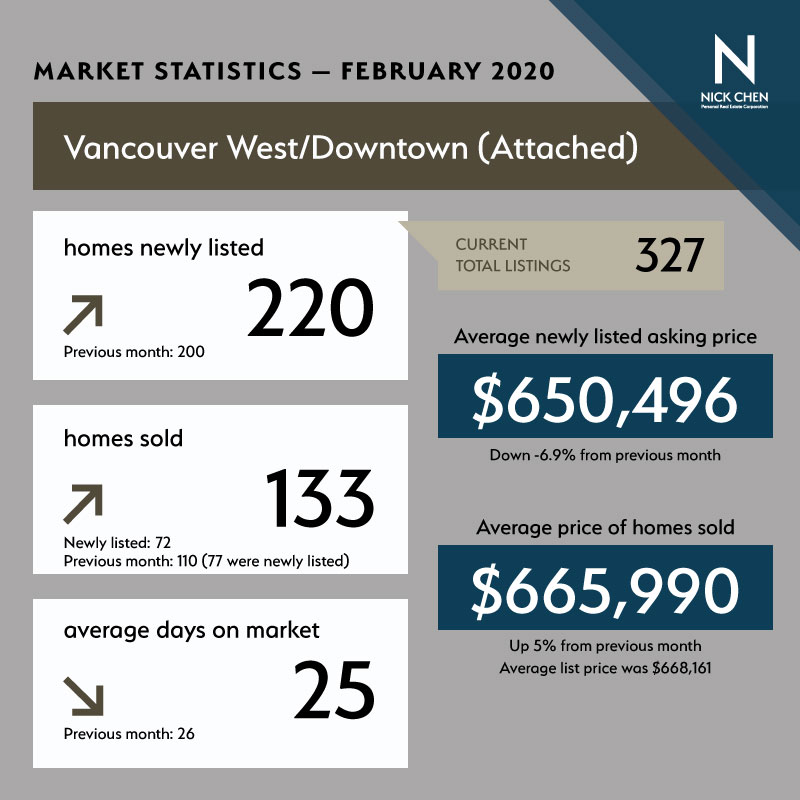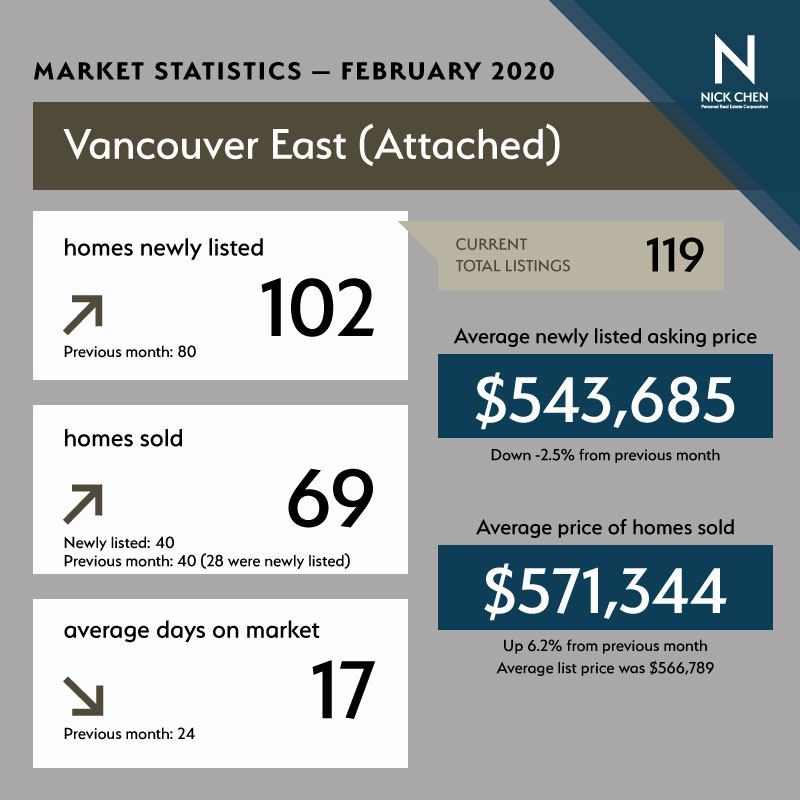We are now into the second month of 2020, nearing the end of winter. Historically this is the time sellers and buyers prepare for the hotter spring market. How did the month perform?
In the Market
There are areas where its clear buyers are focusing on; and to be more specific, there are specific areas with specific types of homes that buyers prefer. Some noticeable trends are as follows.
Starting with detached homes, Areas East Vancouver and Burnaby saw the popularity of listings that are land value, homes needing work, or renovated homes under $1.5M increase. Same with neighbourhoods in Vancouver West and Richmond, where homes under $2M have had the most transactions.
For attached homes, buyers in Vancouver West, East, and Downtown continue to favor studio and 1 bedroom homes. This is the same in Burnaby, where 4 bedroom homes had the most attention from buyers. This contributed to higher average sales prices in some areas and stronger sales numbers. However, they are not necessarily correlated. As we have seen in the past two years, stronger sales numbers do not always mean higher average sales prices.
If more comparatively lower priced 1 bedrooms sell than higher priced 2 or 3 bedrooms, it would skew the total average sale prices. This is why it’s important to properly look at relevant data in order to competently analyze market trends. It’s not only apples and oranges, it can come down to red vs green apples.
A possible explanation could be the lower price point for first time buyers and investors in desirable areas prove to be too enticing to continue sitting on the sidelines. Although it’s hard to say how the virus outbreak will affect buyer and seller mentality in the coming month, the effect so far has been minimal. Some might be nervous about home viewing or allowing buyers into their home, but so far the majority of those active in real estate are going about as usual.
Compared to Same time in 2019
Higher Average Sales Price
- Vancouver West Detached
- Vancouver West Attached
- Vancouver East Detached
- Vancouver East Attached*
- North Vancouver Detached
- West Vancouver Detached
- Richmond Detached*
- Richmond Attached
- Burnaby Attached*
- New Westminster Detached*
- New Westminster Attached
- Coquitlam Detached
- Coquitlam Attached
- Port Moody Detached
- Port Moody Attached
- Surrey Detached
- Surrey Attached*
(tied with April 2019) - South Surrey + White Rock Attached
Lower Average Sales Price
- Downtown Vancouver
- West Vancouver Attached
- Burnaby Detached
- South Surrey + White Rock Detached
Higher Sales Volume
- Downtown Vancouver
- Vancouver West Detached
- Vancouver West Attached
- Vancouver East Detached
- Vancouver East Attached
- North Vancouver Detached
- West Vancouver Detached
- Richmond Detached
- Richmond Attached
- Burnaby Detached
- Burnaby Attached
- New Westminster Detached
- New Westminster Attached
- Coquitlam Detached
- Coquitlam Attached
- Port Moody Attached
- Surrey Detached
- Surrey Attached
- South Surrey + White Rock Detached
- South Surrey + White Rock Attached
Higher Sales Volume
- West Vancouver Attached
- Port Moody Detached
What’s Next?
What else should we be aware of in the coming month? The big news include the Bank of Canada lower interest rates by 50 basis points to 1.25%. It’s a pretty big deal; the COVID-19 outbreak was cited as the main reason. The virus is causing global disruptions to trade and supply, and it’s starting to be reflected in national and international economic outlooks. Combined with government policies, economic growth looks to be negatively impacted. (source)
So what does this mean for buyers and sellers? Along with the adjustments to the mortgage stress test, buyers may be able to have slightly stronger buying power. According to ratehub, and I’m quoting word for word, “a full 50-basis cut to a $450,000 mortgage on a 2.6 variable rate would shift the mortgage rate to 2.1%, and mean about $115 per month in savings per month, while an $800,000 mortgage is more like $200 a month in savings”. Additionally, with the change to the stress test buyers may mean thousands more in savings. But to be clear, I am not a mortgage broker and as such, you need to consult with your mortgage broker or bank for more clarification and information specific to your financial situation. (source)
Highlight Markets



